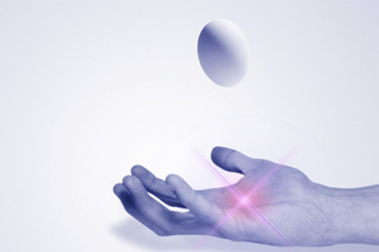Egg Donation
 Through
continuing advances in reproductive medicine, the
estimated 10 to 15% of couples who are unable to conceive
or carry a pregnancy have a number of new options.
Some of these options involve a third person in the
pregnancy process -- a healthy, young woman who is
willing and able to provide special help so that a
couple may become a family. One such way is through
egg donation. Through
continuing advances in reproductive medicine, the
estimated 10 to 15% of couples who are unable to conceive
or carry a pregnancy have a number of new options.
Some of these options involve a third person in the
pregnancy process -- a healthy, young woman who is
willing and able to provide special help so that a
couple may become a family. One such way is through
egg donation.
What is egg donation?
Egg donation is the process through which a woman
donates her eggs for the benefit of an infertile couple.
The donated eggs are fertilized in the laboratory
with the husband's sperm, and his wife carries the
pregnancy. This may be the solution for couples in
which the wife has absent or poorly functioning ovaries,
is over the age of 40, or has a history of genetic
diseases, which could be passed onto her offspring.
Donor
types:
There are two major types of egg donors. The first
is a “Designated Egg Donor”. The designated
egg donor is usually a friend or relative of the recipient.
While certainly possible, this form of egg donation
is usually discouraged. Your physician will address
the reasons for concern.
The second type is an “Anonymous Egg Donor”.
This is the most common type of egg donor. These egg
donors are women who have offered to donate their
eggs anonymously with reasonable reimbursement. The
anonymous donors are obtained through advertisement
and word-of-mouth. Many of these egg donors have had
friends or relatives who have experienced infertility.
Excellent egg donors
- 18 to 31 years of age (Required
for anonymous donors)
- Completed childbearing
- No family history of genetic
diseases
- No history of sexually transmitted
diseases
- Partner agrees to the procedure
Non-accepted
egg donors
- Less than 18 and greater than
40 years of age
- Family history of significant
genetic diseases
- History of active sexually transmitted
disease
- Partner does not agree to the
procedure
Inadvertent
Consanguinity:
It is theoretically possible that an egg donor could
donate enough times to statistically increase the
risks of half-brothers and sisters (same egg donor
mother but different fathers) could meet and reproduce. According to existing guidelines, it is recommended
that we limit a single donor from producing no more
than 15 offspring per 500,000 population. We here
at SRMS limit a single donor to no more than six successful
donated offspring. Please recall that we here at SRMS
cater to a large population conservatively estimated
at over 1,000,000 throughout Southwest Florida, not
including other states and countries. According to
guidelines, we could easily have over 30 offspring
per egg donor before retiring the donor.
Transmission
of Infections:
The donor and recipients undergo exhaustive evaluation
of potentially transmittable diseases. It should be
recalled that the egg donor is only donating a dozen
or so single cells (eggs) and that the transmission
of diseases requires a certain level of inoculum well
beyond these numbers. The transmission of any diseases
from a donor to a recipient is a very rare event and
it is uncertain if it has ever happened in the past.
That stated, the potential for transmission of currently
known and unknown diseases is theoretically present.
To keep perspective, it is far more likely the egg
recipient will have exposed herself to a much greater
inoculum and risk of infection through past and current
sexual partners. In summary, the probability for transmission
of disease is quite remote and is minimized through
careful laboratory testing of the egg donor.
We invite you to visit the other links at the general navigation section including "Florida Statutes", "Finding Your Egg Donor", "Donating Your Eggs" (general information) and of course, "Search Egg Donor Data Base". |



 Through
continuing advances in reproductive medicine, the
estimated 10 to 15% of couples who are unable to conceive
or carry a pregnancy have a number of new options.
Some of these options involve a third person in the
pregnancy process -- a healthy, young woman who is
willing and able to provide special help so that a
couple may become a family. One such way is through
egg donation.
Through
continuing advances in reproductive medicine, the
estimated 10 to 15% of couples who are unable to conceive
or carry a pregnancy have a number of new options.
Some of these options involve a third person in the
pregnancy process -- a healthy, young woman who is
willing and able to provide special help so that a
couple may become a family. One such way is through
egg donation.


